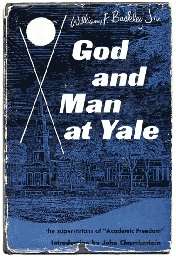God and Man at Yale
God and Man at Yale: The Superstitions of "Academic Freedom" is a 1951 book by William F. Buckley Jr., based on his undergraduate experiences at Yale University. Buckley criticized Yale for forcing collectivist, Keynesian, and secularist ideology on students, criticizing several professors by name, arguing that they tried to break down students' religious beliefs through their hostility to religion and that Yale was denying its students any sense of individualism by making them embrace the ideas of liberalism. Buckley argued that the Yale charter assigns oversight authority of the university to the alumni, and that because most alumni of Yale believed in God, Yale was failing to serve its "masters" by teaching course content in a matter inconsistent with alumni beliefs. Buckley eventually became a leading voice in the American conservative movement in the latter half of the twentieth century.
 Cover of the first edition | |
| Author | William F. Buckley Jr. |
|---|---|
| Country | United States |
| Language | English |
| Subject | Yale University |
| Publisher | Regnery Publishing |
Publication date | 1951 |
| Media type | |
Reviews and legacy
God and Man at Yale received some mixed or harsh reviews when it was first published, including those of Peter Viereck[1] and McGeorge Bundy.[2]
Many American academics and pundits underestimated the ultimate impact that the book and Buckley would have on American society, thinking that it would quickly fade into the background. Quite the opposite happened, as Buckley used it as a launching pad into the public eye. Buckley himself credited the attention his book received to its introduction, written by John Chamberlain, saying that it "chang[ed] the course of his life" and that the famous Life editorial writer had acted out of "reckless generosity."[3] Buckley went on to be an active force in the conservative movement through the political magazine he started, National Review, and his television show Firing Line. The book and its author played a crucial role in tying together the different factions of the arising conservative movement to form a potent political force.
George Will called the book "a lovers' quarrel with his alma mater."[4]
Assessments in 2011, sixty years after publication of the book include:
- "All-TIME 100 Nonfiction Books" of TIME magazine on "the 100 best and most influential [books] written in English since 1923" (the first publication year of TIME)[5]
- a National Review symposium on the book.[6]
References
- Peter Viereck (1951). "Conservatism under the Elms," The New York Times, Books section.
- McGeorge Bundy (1951) "The Attack on Yale.", The Atlantic Monthly, Nov.
- Chamberlain, John (1982). A Life With the Printed Word. Chicago: Regnery Gateway. p. 147. ISBN 0895266563.
- Will, George F. (29 February 2008). "A Life Athwart History". The Washington Post. Katharine Weymouth. p. A19. Retrieved 8 October 2012.
- Dan Fastenberg (2011). "God and Man at Yale", Aug. 17.
- Lee Edwards, Alvin S. Felzenberg, George H. Nash, Charles R. Kesler, and Danilo Petranovich. (2011). "God and Man at Yale, Now: WFB's Classic at 60," Nov. 10.
Bibliography
- Godfrey Hodgson, The World Turned Right Side Up: A History of Conservative Ascendancy in America (Boston: Houghton Mifflin, 1996), pp. 75–77
- “William Buckley.” American Decades CD-ROM. Gale Research, 1998. Reproduced in Biography Resource Center. (Farmington Hills, MI: Thomson Gale, 2005)
External links
- The Revolt against the Establishment: God and Man at Yale at 50, by Austin W. Bramwell, The Intercollegiate Review, Fall 2001. 2011)
- Denis Boyles, God, Man, Buckley, and Me, National Review, Feb 29, 2008.